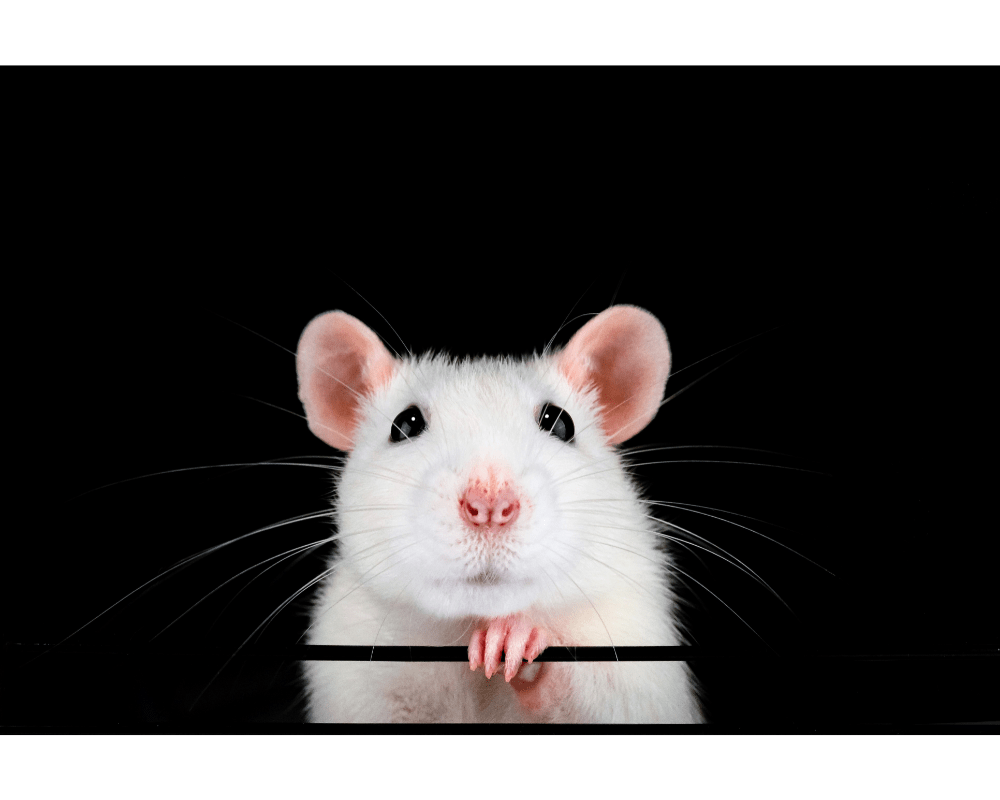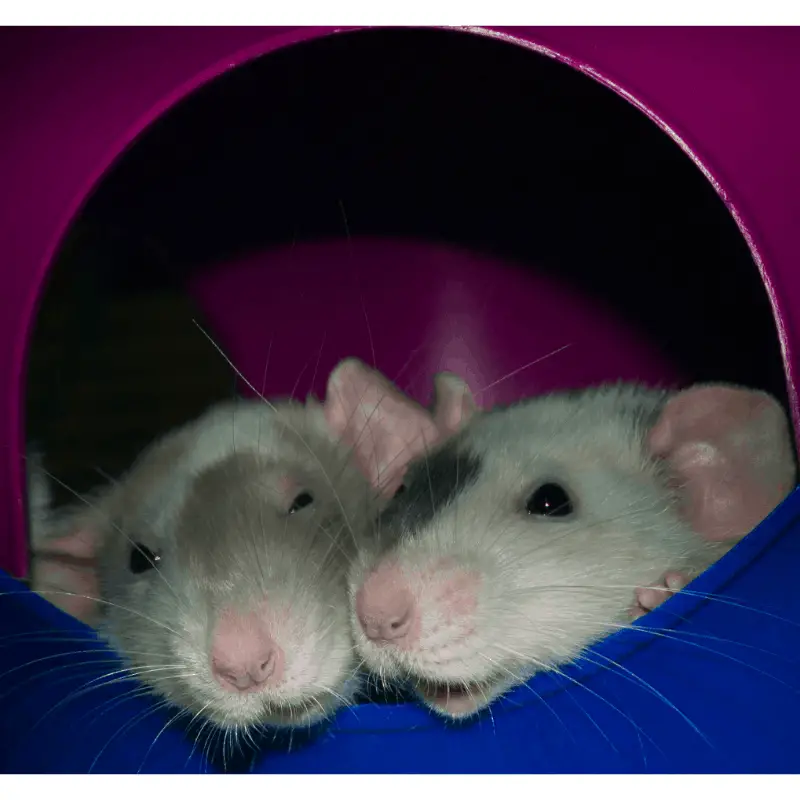This article contains affiliate links, and we may earn a commission at no cost to you if you choose to purchase through these links. I never recommend products that I do not trust or will not advise my veterinary clients and patients to use.
When choosing a new pet, one of the most important things to take into consideration is their activity schedule, as this ideally needs to line up with yours in order to ensure that you can spend as much time as possible with your new furry companion.
In this article, we will explore exactly what a pet rat’s activity schedule looks like, specifically focusing on their sleeping habits and activity levels during the darker hours of the day so that you can know exactly whether or not your much-deserved sleep will be influenced by this inquisitive critter.
So, are pet rats nocturnal? Pet rats are nocturnal animals by design but have adapted over the years through means of domestication to become more crepuscular, which means that they are most active during the early morning and late afternoon hours of the day.
Pet rats are typically more active during the night, but they can adapt their sleeping schedule to align more with yours if this becomes enforced by means of routine. So even though these creatures were designed to be awake when we are asleep and vice versa, there are many things that you can do in order to get along very well with these unusual pets without compromising your or their beauty sleep.

What Is The Difference Between Nocturnal And Crepuscular?
In order to understand the activities of pet rats, we need to look at the three main types of activity periods for most animals during any 24 hour period:
Nocturnal
Nocturnal animals are only active during the darkest part of the night, without any light of day. Examples of these will include badgers, hedgehogs, and owls.
Crepuscular
Crepuscular animals are most active during mainly the dusk and dawn periods of the day when daylight could be dim, but navigable. Examples of these will include cats and hamsters.
Diurnal
The third group is called diurnal, and these species are most active during the daylight portion of the day. Sounds familiar? Well yes, examples of these include us humans, dogs, birds, and squirrels.
Wild rats are mostly nocturnal, but most domesticated rats have adapted to adjust their schedules in order to align more with ours, and in the process of syncing the two, they are actually now more crepuscular than nocturnal, being more active during the twilight hours of the day when we start to become active and right before we get ready for bed.
Why Are Rats Nocturnal / Crepuscular Animals?
A rat’s circadian rhythm, which is a natural, internal process that regulates its sleep-wake cycle every 24 hours, has evolved to respond to increases in light, based upon the activity patterns of rats throughout the ages.
The main reason for this natural process is because of the rat’s adaption to try and avoid detection under the cover of darkness when scavenging for food. Rats are, in general, prey animals, and by only coming out at night time they are less likely to be attacked and killed by predators. This is mostly indicative of wild rats, yet the same process is still part of the behavioral pattern of pet rats as well.
Rats have poor eyesight and can thus see best in low-level lighting. They also need to depend on their other senses, such as smell and hearing, to navigate and perceive what is happening around them. Nighttime is a much quieter time of day, which does help to improve their senses, making them feel safer and therefore making them much more active.
How Do Pet Rats See At Night?
Rats have very poor eyesight in comparison to many of their predators. Rats are classified as “dichromats”, which means that their perception of color is very similar to a human with color blindness.
But what makes rats unique, is their ability to see ultraviolet light, which is outside of the visible light spectrum for us humans. Rat urine becomes clearly visible when viewed with ultraviolet light, and they, therefore, tend to leave a trail of urine drops as they travel through the environment as this aids in navigation, helping them to locate food sources and find mates. During the twilight hours of the day, the ratio of ultraviolet light to visible light increases significantly, which also explains their increased activity levels.
Their whiskers are also very sensitive and form an important part of their navigational toolset. Rats are able to tell the direction of movement as well as how far each whisker moves. This information is then sent to their brain where it is utilized to maneuver around their environment.
Rats also have well-developed smell and hearing senses, and together with their whiskers, they manage to “see” very well at night despite having very poor eyesight.
Are Pet Rats Noisy At Night?
Since rats are mostly active during nighttime, the noise that you will hear from their cage will usually be based on activity. Chirping and squeaking sounds are directly related to a response in stimulation or fulfillment of biological needs, such as eating and drinking but can also be related to socializing, exercising, or even a form of stress.
They are not noisy animals themselves and are fairly quiet when compared to many other household pets. What can become problematic in terms of noise levels though, is their water drinker and wheel, but luckily there are “silent” options available for both that can be purchased. Check out our recommendation on Amazon.
What Type Of Activity Will My Pet Rat Do During The Night?
As rats will mostly be awake during the dark hours of the day, they will mostly be keeping themselves busy with a combination of the following:
Eating and drinking
Rats are used to forage during nighttime in order to avoid predators, and thus they will continue to want to eat and drink during the night. They may start to learn to eat and drink during the day in between rest breaks as well, but should never be forced to eat and drink during the daytime by taking away their food and drink from the cage at night, as this will likely result in frequent squeaking sounds at night due to stress.
Exercising
Pet rats will perform a great amount of physical activity in their cages during the night. You will probably hear your rat running on his rat wheel and climbing his cage. According to this study, your rat’s physical activity will likely be increased at night if noises during the day have kept your pet rat from getting a proper amount of sleep.
Socializing
Pet rats are social creatures, and when not busy foraging, they tend to spend a lot of time playing and communicating with each other. We cannot really hear how they communicate as they use high-frequency ultrasound waves that are not audible for the human ear. They call out to locate their mates, use them during the mating process and their young will also communicate with their parents using these ultrasound waves.
Rats are also very active right after given birth, as building and maintaining nests are an important part of their rituals.
Can Pet Rats Adjust Their Sleeping Routine To Ours?
A pet rat that receives attention in the morning when you first wake up and at night before you go to bed, is likely to remember this and will start to ensure that they are awake the next time to receive some affection.
If you make it a point of petting your rat when you’re awake, they’ll start to learn your schedule and may decide to adapt theirs to fit yours.
This will vary from one rat to the next though, as each has its own personality, but the more time you spend with your rats, the stronger the bond will form between you, and the more they’ll be able to make you part of their lives.

How Long Do Pet Rats Sleep For?
One study suggested that rats tend to spend up to three-quarters of their day in some kind of sleep state, but generally, we have seen that rats will sleep on and off for up to 15 hours per day. They like to break these up into different naps during the day and will wake up to eat, drink, groom and play after which they will go back to sleep some more.
Rats that are in groups or pairs tend to sleep a bit less since they have a partner with whom they can socialize. It is very common for rats to get lonely and bored, and a tell-tale sign of this will be that they will sleep longer than usual.
How Can I Help My Pet Rat Get Better Sleep?
These are a couple of very useful tips that you can implement in order to provide your pet rat with the best sleep possible:
Avoid busy and noisy rooms
Rooms that are noisy and have a lot of traffic are not ideal and should at all costs be avoided, but on the other end, tucking the cage into a seldom-used room will also make your rats feel lonely. Try and find a good balanced middle ground where you can put their cage, where your rats will be able to see you every day whilst still being able to rest and relax adequately.
Bedrooms aren’t great, as their nighttime activities might keep you out of your sleep and rats can also end up feeling neglected if left in a bedroom alone all day.
Avoid brightly lit rooms
Bright lights can easily cause stress and may even harm a rat’s sensitive eyes. They prefer to sleep in the dark and when awake, they tend to steer away from direct sunlight. Rather try and install dimmed lights with nothing focused too closely on the rat’s cage.
Do not startle your pet rats
Pet rats aren’t known for biting people without good reason, but reaching out and touching a sleeping rat might startle them which can result in them giving you a nasty bite. This is mostly out of self-defense but can result in serious problems, so rather try and avoid the situation completely by letting them be while they are sleeping.
Feed your pet rats at the same time every day
Not only does feeding your rats help to increase the bond you share, but it also teaches your rat at what time you will be popping by with food. If you are very punctual and stick to the same feeding times every day, you’ll start to notice that your rat will adapt and be awake and ready every time you stop by.
Provide safe sleeping hideouts
Just like us, pet rats will need to feel safe and protected when sleeping. They prefer to sleep in a type of space that is not exposed, well hidden away, and properly ventilated. Small cardboard homes, tunnels, plastic houses, igloos, and hammocks are all great objects to provide for your rat to sleep in.
Just be careful and make sure that the materials you provide to them are safe and hardy, as they will most likely try and nibble on them.
Make sure they have some company
Pet rats require a lot of mental stimulation and can benefit a lot from being given a partner. They are incredibly social creatures who do value time spent with friends and family. Keeping rats partnered up will prevent them from feeling forgotten and neglected, and will provide them with more types of activities when they are awake.
Do Pet Rats Sleep With Their Eyes Open?
During the nighttime, when their environment is dark, it is quite common for rats to sleep with their eyes half or fully open. Whereas when it is light, they are more likely to close their eyes to stop the light from keeping them awake.
You may be startled to see your rat sleeping with their eyes open, as at first, it may look like they are dead. But just check to make sure they are breathing by observing their body movements, as in most cases they are probably just snoozing really deep.
Do Pet Rats Sleep Together?
Once again, pet rats are very social animals and it is therefore normal for a pair of rats to cuddle up and sleep together, how adorable!
If some of your rats are not sleeping together, it may be an indication that they do not like each other or that one of them is sick. Make sure they aren’t fighting and look carefully for any other signs of illness.
If they seem to be getting along otherwise and are not looking sick, then don’t worry too much about it. Just like we don’t always like everyone else, it is often the same case with rats.
Do Male Rats Sleep More Than Female Rats?
Male rats tend to be lazier and will sleep a lot more than female rats. You will mostly start to notice this once a rat reaches one year of age, whereas female rats tend to be much more energetic and playful throughout their entire lives.
Conclusion
Despite pet rats being nocturnal/crepuscular, they still make for excellent pets that are much quieter than most other companion animals. Most pet rats will end up sleeping through the day during the hours that you are at work or school and will become more active once you get home.
The stronger the bond becomes between you and your rat, the more time the rat would want to spend by your side, and the more he will try and adjust his schedule accordingly.
And most importantly, the more you integrate them into your life, the more they will integrate you into theirs.
